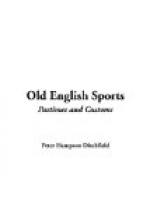The Scots were famous formerly, as they now are, for prowess in the game, and the account of the Shrove Tuesday match between the married and single men at Scone, in Perthshire, reads very like a description of a modern Rugby contest. At Inverness the women also played, the married against the unmarried, when the former were always victorious. King James I., who was a great patron of sports, did not approve of his son Henry being a football player. He wrote that a young man ought to have a “moderate practice of running, leaping, wrestling, fencing, dancing, and playing at the caitch, or tennis, bowls, archery, pall-mall, and riding; and in foul or stormy weather, cards and backgammon, dice, chess, and billiards,” but football was too rough a game for his Majesty, and “meeter for laming than making able.” Stubbs also speaks of it as a “bloody and murthering practice, rather than a fellowly sport or pastime.” From the descriptions of the old games, it seems to have been very painful work for the shins, and there were no rules to prevent hacking and tripping in those days.
Football has never been the spoilt child of English pastimes, but has lived on in spite of royal proclamations and the protests of peace-loving citizens who objected to the noise, rough play, and other vagaries of the early votaries of the game. Edward ii. and succeeding monarchs regarded it as a “useless and idle sport,” which interfered with the practice of archery, and therefore ought to be shunned by all loyal subjects. The violence displayed at the matches is evident from the records which have come down to us, and from the opinions of several writers who condemn it severely. Free fights, broken limbs, and deaths often resulted from old football encounters; and when the games took place in the streets, lines of broken windows marked the progress of the players. “A bloody and murdering practice,” “a devilish pastime,” involving “beastly fury and extreme violence,” the breaking of necks, arms, legs and backs—these were some of the descriptions of the football of olden times. The Puritans set their faces against it, and the sport languished for a long period as a general pastime. In some places it was still practised with unwonted vigour, but it was not until the second half of the present century that any revival took place. But football players have quickly made up for lost time; few villages do not possess their club, and our young men are ready to “Try it out at football by the shins,” with quite as much readiness as the players in the good old days, although the play is generally less violent, and more scientific.




